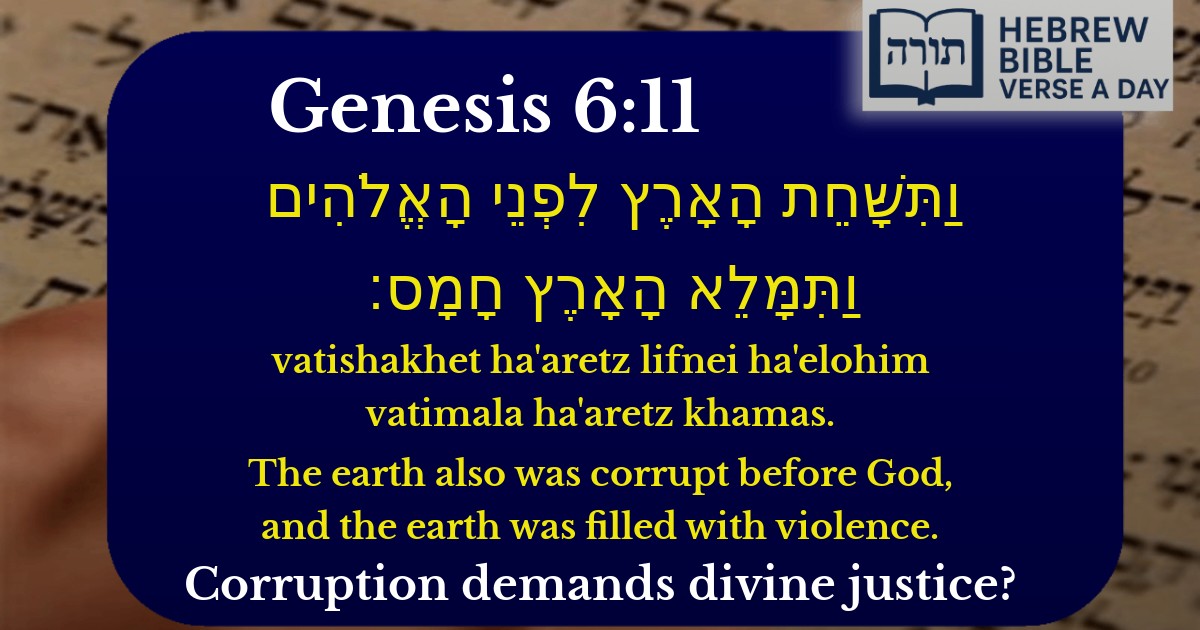Frequently Asked Questions
Q: What does it mean that 'the earth was corrupt before God' in Genesis 6:11?
A: According to Rashi, the corruption refers to widespread idolatry and immoral behavior. The Talmud (Sanhedrin 57a) explains that people were stealing openly and engaging in forbidden relationships, which led to moral decay. The phrase 'before God' emphasizes that this corruption was blatant and shameless, done openly without fear of divine judgment.
Q: Why was the earth 'filled with violence' in Genesis 6:11?
A: The Rambam (Maimonides) explains in Mishneh Torah that this violence included robbery and oppression. The Midrash (Genesis Rabbah 31:6) states that even animals were affected, with different species mating improperly. This complete breakdown of moral boundaries in both human and animal realms showed how deeply society had deteriorated.
Q: What lesson can we learn from Genesis 6:11 about how society should behave?
A: This verse teaches the importance of maintaining moral boundaries in society. As the Ramban (Nachmanides) explains, when theft and violence become normalized, it leads to complete societal breakdown. Jewish tradition emphasizes that respecting others' property and maintaining ethical behavior are fundamental to a functioning society, as seen in the Seven Noahide Laws given to all humanity.
Q: How does Genesis 6:11 relate to the story of Noah?
A: This verse explains why God brought the flood in Noah's time. As Rashi comments, the corruption and violence became so severe that divine intervention was necessary. The Sforno adds that society had reached a point where repentance was impossible, making the flood inevitable. Noah stood in contrast to this corruption, which is why he was chosen to survive.
Q: Does Genesis 6:11 have any relevance to our world today?
A: Yes, Jewish tradition sees this as a warning about moral decay in any generation. The Talmud (Avodah Zarah 4a) teaches that we must learn from this episode to maintain justice and morality in society. When theft and violence become commonplace, it endangers the entire social order, just as it did before the flood.


Understanding the Corruption and Violence
The verse states, "The earth also was corrupt before God, and the earth was filled with violence" (Genesis 6:11). Rashi explains that the term "וַתִּשָּׁחֵת" (was corrupt) refers to idolatry and sexual immorality, as these were rampant in the generation of the Flood. The corruption was not merely societal but a spiritual decay that permeated all aspects of life, leading to divine judgment.
The Nature of the "Violence" (חָמָס)
The word "חָמָס" (violence) is interpreted by the Midrash (Bereshit Rabbah 31:5) as referring to robbery and oppression. The Rambam (Hilchot Gezeilah 1:7) elaborates that theft was so widespread that people openly seized one another's property without fear of consequences. This lawlessness demonstrated a complete breakdown of moral order.
The Consequences of Moral Decay
The Talmud (Sanhedrin 108a) teaches that the decree of the Flood was sealed primarily due to חָמָס (violence), as it undermined the very fabric of society. The Sages note that while other sins may be pardoned, widespread violence and corruption leave no room for repentance, necessitating divine intervention.
This verse serves as a timeless warning about the dangers of moral and societal decay, emphasizing the need for justice, ethical conduct, and reverence for God in maintaining a stable and holy world.